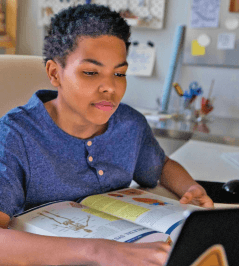The COVID-19 pandemic has brought a lot of challenges to the education sector in Uganda. Even before coronavirus hit the country, all education institutions were closed and the country was sent into a lockdown. This helped contain the disease and we thank the Government. However, the closure of schools came at a cost and as parents and teachers, we must be innovative to effectively fit into the new normal.
Before COVID-19, many parents were used to having their children out of home and in schools studying. However, with the closure of schools, most children are studying at home and parents and guardians are having a hard time coping with the change.; thanks to companies such as Vision Group, which are helping give our free reading materials in their newspapers.

A computer is a
necessary tool
for self-study
Today, we will discuss home-study, its advantages and how parents and guardians can help their children with it. Home-study involves studying without direct supervision or attendance in a classroom. It is a valuable way to learn and because of the COVID19-induced lockdowns, it is quickly growing in popularity among parents and students.
It is generally believed, and data proves it, that by complementing formal education with home study, students can gain a better understanding of the subject matter and, consequently, see a big improvement in grades and students’ confidence.
Many students study at home to supplement their class-based learning.However, self-study can also be used to master a new skill or learn an entirely new concept, such as a language or an instrument.
Practicing Home Learning
The benefits students can gain from self-study are endless and are completely determined by the students’ goals and the support they get from parents and guardians.
As parents, for the learning to work, you have a responsibility to support the process. You must be wondering how best you can get involved. Here is how you can go about it.
There are various self study methods that can be implemented at home that can bring about many educational benefits both in and out of school. Specifically, parents can do the following to support their children in studying at home.
- Have a conversation with your child about what is being learned at school and what topics your child is interested in. This will encourage students to strive to learn more.
- Read books and articles on a topic of study or interest. Whether this is in connection with a course or just at your child’s own leisure. Encouraging your child to read is a highly effective way to increase understanding of new concepts. Take a trip to the library together or invest in some classics on a topic to provide the best reading materials suited for your child’s self-study.
- Watch educational videos to keep children actively engaged in a concept. There are many tutorial videos that are intended for teaching people new skills or educational shows aimed at complementing what students learn in school. Whether your child is trying to learn another language or figure out how to conduct a science experiment, they can greatly benefit from audio and visual walk-throughs that are available on the Web.
- Use educational games. There are many applications that you can access through your phone or desktop computer that promote learning in math, English and a variety of other courses. Using games as a means to studying does not have to be technology-based; you may put the phone down and get hold of board and card games that promote strategy and logic. Encourage your child to associate learning with fun.
- Work through practice questions to reinforce skills that are learned at school. Help hold your child’s attention while working through the practice questions by incorporating games, rewards and challenges. Incorporating these techniques will help them view the material in a new way and reinforce what is learned in the classroom.
- Reduce domestic work. Heavy house work, especially for girls, may interfere with your child’s home study. Make sure you leave enough time for your child to spend on thinking and problem solving. Setting aside time and space as study time for your child is critical for success.
Study Tools
The following are suitable tools to study at home A study area is crucial for effective self-studying. This might mean a room, home office or desk in the student’s bedroom. No matter where it is, it should include a tidy work space – free of clutter and distractions – with good lighting.
- A computer is necessary for many methods of self study, especially where reading, watching or listening to online resources are concerned. However, if your child prefers completing work by hand or if they do not have access to technology, non-digital study tools, such as the time-tested pen and paper, can be used.
- Note-taking tools, such as highlighters, coloured pens and sticky notes are useful tools for a student studying at home. Keeping notes while learning will enable your child to retain the information longer and help to build valuable organisational skills. Home study is an important method of learning. It has been used before COVID-19 and now, in the age of COVID-19, it is a desirable way to learn.
By: AKASA ALBE OMAR | Quality assurance manager at the International University of East Africa












